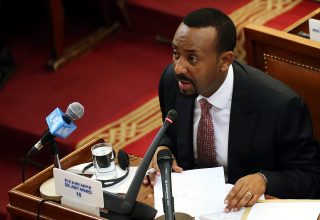On April 2, 2011, when the foundation stone of the Grand Ethiopian Renaissance Dam was laid by then Prime Minister Meles Zenawi, Ethiopians celebrated as they anticipated a future without blackouts. The $4.8 billion power project (still under construction) is expected to boost industrialisation in the country as well as attract revenue for the government.
Ethiopia has always treated the project with secrecy without releasing much information on what is regarded as Africa’s largest dam. But the mega-project has not been able to avoid controversy with experts and NGOs issuing warnings on lasting geopolitical tensions it may trigger.
The Blue Nile, where the GERD is situated, happens to be an important shared river with Egypt, Sudan, and some communities in Kenya. The potential environmental impacts of the dam leave the neighbours, which depend on the Nile as their main source of fresh water and livelihoods, at unease.
Recently, disputes erupted among the three countries over the potential food and water crisis the project poses on the downstream countries. Egypt and Sudan have made several unsuccessful efforts to get Ethiopia to reach an agreement on how the dam would be filled.
This prompted the Sudanese government to write the United Nations Security Council about the dangers of the GERD. UNSC has warned that the dam poses a great threat to millions of people in the region if Ethiopia went ahead with plans to fill it up before a deal was signed.
With tensions still very much rife, the Ethiopian government on Saturday, October 24, 2020, summoned United States’ Ambassador Mike Raynor, seeking clarifications on comments made by President Donald Trump. The country accuses the American leader of ‘incitement of war’ when he mentioned that Cairo could end up “blowing up that dam” in what he regarded as a dangerous situation.
According to a report, Trump called for an agreement between the countries last Friday during a call with Sudanese Prime Minister Abdalla Hamdok. This came after the announcement that Sudan and Israel were set to normalise ties.
The United States President said he had negotiated an agreement to resolve the issue but that Ethiopia had broken the pact. This, Trump said is forcing him to cut funds, while adding that “they will never see that money unless they adhere to the agreement … You can’t blame Egypt for being a little upset.”
Meanwhile, a statement from Prime Minister Abiy Ahmed’s office indicates that there had been significant progress in resolving the dispute since the African Union took over the negotiations. Abiy has also mentioned that “occasional statements of belligerent threats to have Ethiopia succumb to unfair terms still abound.”
While in talks with the US ambassador, Gedu Andargachew, the Ethiopian Foreign Affairs Minister said: “The incitement of war between Ethiopia and Egypt from a sitting U.S. president neither reflects the longstanding partnership and strategic alliance between Ethiopia and the United States nor is acceptable in international law governing interstate relations.”








